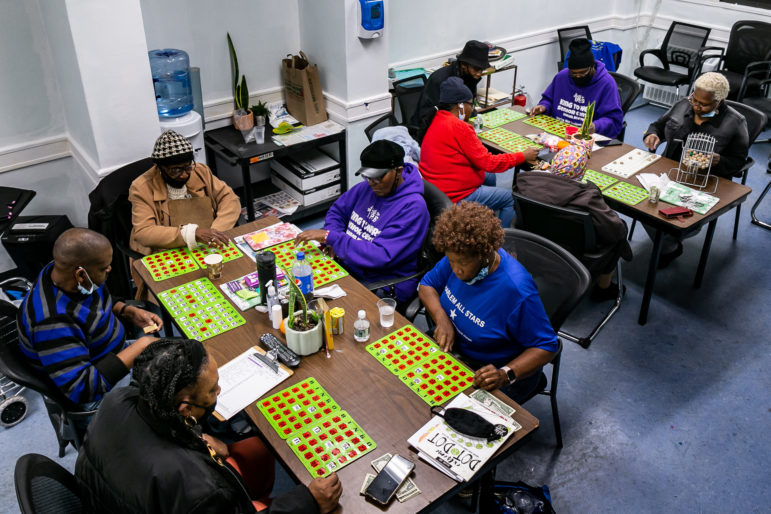“The reality is that many older adults have already survived trauma—and those experiences carry so much wisdom, perspective, and resilience to share as a result. Investments to increase access to mental health support for seniors would go a long way.”

Adi Talwar
A bingo game in progress at the PSS King Towers Senior Center in Harlem, pictured here in October 2021.May is Mental Health Awareness Month. It is an ideal time to increase awareness about mental health, de-stigmatize the topic, and understand the challenges, needs and pathways to support these important services.
Over the past two years, it has been promising to see the awareness and care as communities have started to focus on the impacts of the pandemic on the mental health of children and adolescents, and the adults and families who care for them. But there is another vulnerable population that is often left out of the care conversation—older adults.
As director of The Center for Resiliency and Wellness at Greenwich House, I have seen first-hand the rising rates of anxiety, depression, and re-traumatization among our older clients which have been amplified by the pandemic. According to a January 2022 report from The Commonwealth Fund, older adults in the United States are far likelier to report receiving a mental health diagnosis—and to have problems getting needed care—than older adults in 10 other high-income countries.
The challenges are complex, and often interconnected. There was the isolation of the pandemic, coupled with the loss of rituals around grief, like hospital visits and funerals. More time alone meant more opportunity to ruminate on and relive past traumas. Older adults lost in-person communities at senior centers, which are especially important in New York City, where many elderly citizens do not have family nearby.
The shift to tele-health for mental health and psychiatry needs, an emerging approach prior to the pandemic, proved to be a genuine life-saver during COVID. But the same tool that is easily utilized by many age groups was inaccessible for far too many seniors. The lack of comfort with technology, physical limitations like hearing and vision loss, and limited access to reliable and affordable internet have often made access very difficult.
Rising anti-Asian and anti-Semitic violence has created a great deal of fear, and while the Black Lives Matter and MeToo movements brought to the forefront crucial societal conversations, for some they also amplified the pain of historical trauma.
The silver lining as we hopefully look to adjust course and help this group, is that older adults have a tremendous built-in resiliency. The reality is that many older adults have already survived trauma—and those experiences carry so much wisdom, perspective, and resilience to share as a result. Investments to increase access to mental health support for seniors would go a long way.
Here’s how we can further improve the situation:
- The city should expand funding for older adult centers and home health aide services, which provide in-person stabilization in the community and extend a senior’s ability to age in place.
- The Mayor’s Office of Community Mental Health should continue its work to develop mental health programs and training for providers reflective of the populations served in culturally-responsive, evidence-based, trauma-informed practices. Training in cultural competency would improve delivery of services and outreach to communities of color and seniors who identify as LBGTQ+, who may have less access to quality mental health care.
- As we continue to learn more about the mental health impacts of COVID, we need providers who are trained in a range of methodologies—including eye movement desensitization and reprocessing, somatic therapy, and cognitive processing therapy—to help address the full spectrum of needs of older adults.
- Finally, we need more health navigators to assist those without insurance to secure a means to access medical and mental health care. Financial barriers to mental health care are an immense challenge for many New Yorkers, but especially for seniors, who are more likely to be living on a fixed income. Connecting older adults to insurance and other benefits for which they qualify would make a big impact.
This Mental Health Awareness Month, the needs of seniors should be included in conversations around how to improve mental health support for New Yorkers.
Linda Giuliano, LCSW-R, is the director of The Center for Resiliency and Wellness at Greenwich House.
Read more from City Limits’ Age Justice series:








